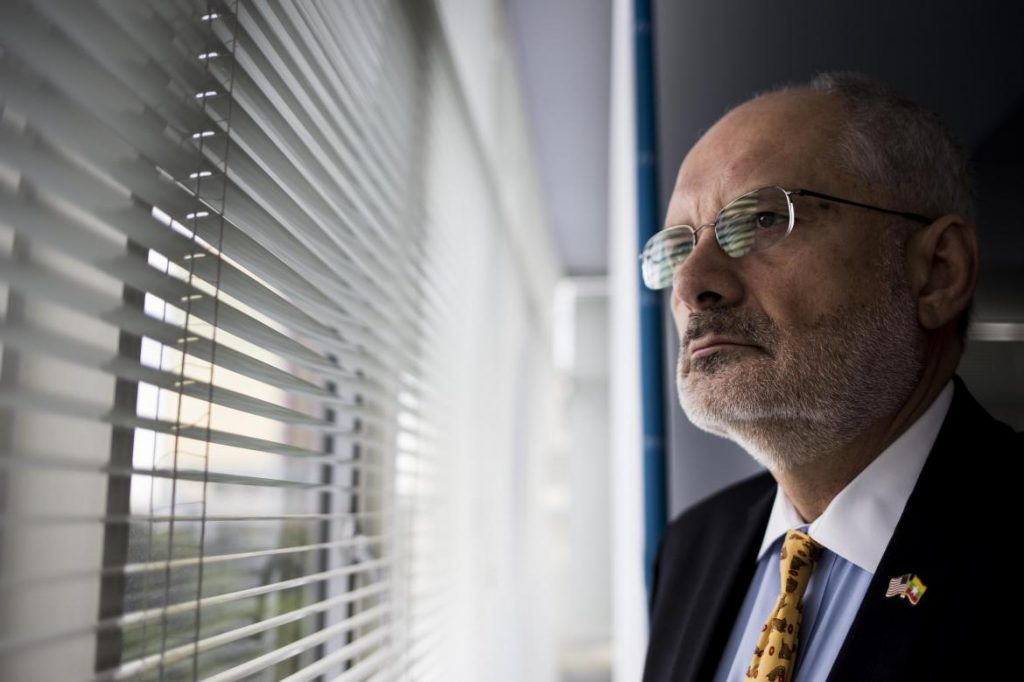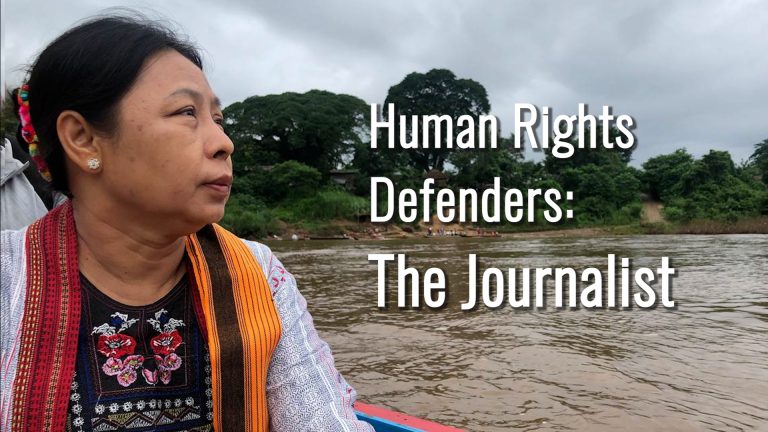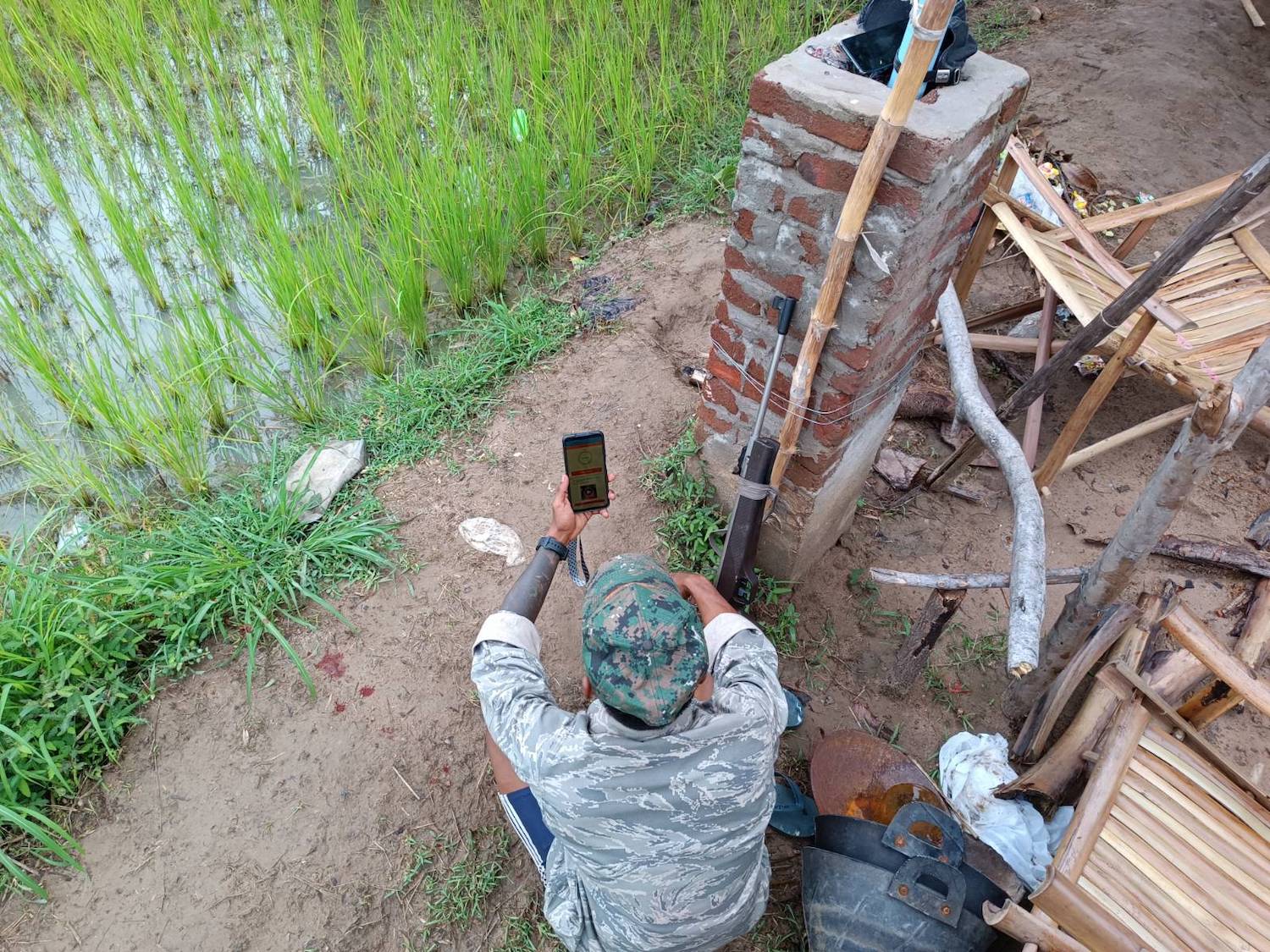Eric Rose is the lead director of Herzfeld Rubin Meyer & Rose, which describes itself as the “first American law firm to open a law office in Myanmar.” Since July 2013, the firm has offered a range of legal services and maintains a pro-bono practice. Mr Rose has risen to prominence for helping Americans to navigate the financial sanctions regime the United States maintains against Myanmar, including a high-profile suit against U Tay Za’s Htoo Group on behalf of an American couple injured in the Air Bagan crash at Heho airport on Christmas Day 2012. He spoke with Frontier about US-Myanmar relations and Washington’s unique sanctions regime, of which he is a vocal critic.
What useful purpose is served by US sanctions against Myanmar?
We, as Americans, are the only ones who still have a sanctions regime that is broad as it is. The rest of the Western countries have a number of limited sanctions against the Tatmadaw, but not against the Tatmadaw’s economic interests. The US, for a number of reasons, has chosen to maintain the sanctions against both SDNs [specially designated nationals] as well as a number of types of activities that are not necessarily related to [individuals], such as trading in jade.
The result of this has been that, with the suspension of a large number of sanctions, that trade would be enhanced between the United States and Myanmar. Unfortunately, because close to 75 percent of the economy in Myanmar is controlled by SDNs – and about half of it controlled directly or indirectly by the Tatmadaw, and another 20 to 25 percent is controlled by the, let’s call them the cronies – the result of that has been that American business has realised pretty quickly that is very expensive to do business here.
With no American banks present in Myanmar, and no American banks willing to repatriate money directly from Myanmar, [there are] no banks willing to engage with a large number of businesses in Myanmar, simply because of the fear of sanctions.
Doing business in Myanmar for Americans is very difficult. Compound that with the attitude that human rights organisations have taken with regards to Myanmar, which has been enshrined in the very unique requirement of registration for [US] businesses that invest more than half a million dollars in Myanmar, and you have a complex set of circumstances that make it difficult for small-and-medium enterprises, in particular, to operate in Myanmar on a regular basis.
Support more independent journalism like this. Sign up to be a Frontier member.
The result of that has been that a number of businesses have had a look at Myanmar and chosen not to come, and we have some businesses that have already pulled out.
If, as you said, 75 percent of the economy is linked directly or indirectly to the military, is that not a justification for the US to maintain sanctions?
That’s the elephant in the room. On a moral ground, a child in Myanmar has the same right to eat as a child in Thailand – which has just had a coup, and has no sanctions against it; a child in Malaysia, which has not had a change of government since independence, or a child in Laos or Vietnam, that has never seen an election in their lives. I look back at this and say, ‘What makes the children in Myanmar different? Why are they being treated with a different set of standards to neighbouring countries?’ Which, I might add, over the past few years have had a track record worse than Myanmar’s. Sure, there is a proportion of the United States that wants to keep the sanctions. But to what end?
Have there been changes in the way the US Office of Foreign Assets Control has managed these sanctions in recent years?
OFAC has actually strengthened the enforcement since August 2014. That strengthening and how they have interpreted the rules since has caused a chilling effect on investment in this country by US persons. American investment over the past year was only $2 million. If you count investment that’s channelled through holding company countries, you’re barely touching a quarter of a billion dollars. It makes us the 13th largest investor in Myanmar.
Although the rules say that companies must register their investments with OFAC if they invest US$500,000 or more, some investment companies who are investing the bare minimum are doing so anyway in the interests of transparency.
An example is American clothing retailer, The Gap, which has not invested heavily in Myanmar but still files reports with OFAC.
Exactly. GE [US multinational General Electric] concluded a transaction with Myanmar Airways worth more than US$1 billion, but it was all conducted offshore [which means it does not have to be declared]. On the ground, GE is very cautious about their spending – they do not want to cross that threshold.
That sounds like a technicality.
It’s not a technicality. The United States is a country of laws, and the law says that only if you make a landed investment into Myanmar, you have to report the half a million dollars. If you don’t make that investment in Myanmar, you don’t have to report it.
This is a requirement that is unique for Myanmar. It doesn’t apply to Thailand, which doesn’t have elections anymore. It doesn’t apply to Vietnam, which has never had elections. People are still disappearing off the street in Laos, and nobody seems to be blinking an eye.
Let’s say you’re a listed individual or entity in Myanmar, and want to get off the SDN list. What do you do?
It’s a procedure that requires you to change the things that got you on the list. Let’s assume you were involved with dealing with North Korea. That would be one of the aspects that would be very important in any examination of whether or not you should be removed from the list. But the fact is that only four people have been removed from the list. U Thein Sein and Thura U Shwe Mann, for political reasons; U Kyaw Thein, who used to be the CFO of the Htoo Group in Singapore; and U Win Aung, who petitioned and successfully convinced OFAC that he has changed how he dealt with the Tatmadaw in the past.
But surely U Win Aung’s removal was a political decision, too, because he’s the head of the Union of Myanmar Federation of Chambers of Commerce and Industry?
He was also the head of the Chamber of Commerce two years ago when [Undersecretary of State Jose] Fernandez came and shook hands with him, even though he was on the SDN list. I’m not convinced that was necessarily a political decision; he has shown that there was willingness on his part to change his ways. But [OFAC has only removed] four people.
In effect, this removal is, as of right now, not working. You can’t do it piecemeal. Even if you remove two guys or three guys, if I want to get into business with you, and you’re not on the SDN list, how do I know that you’re not financed by one of the SDNs?
Let’s say you are a Myanmar company that’s not on the SDN list. You are approached by an American company who wants to do business with you. You need financing – and there’s a sanctioned Myanmar company that is willing to provide it for you. They can transfer money into their finance company in Singapore, who will then transfer that money to your finance company in Singapore. To obfuscate it even further, you then transfer that money into the American company’s Singaporean subsidiary. The transaction is non-disclosable under Singapore’s privacy rules; there’s no track record of how that money is transferred.
So it’s a lot of bureaucracy that doesn’t really change anything?
It’s a method by which certain human rights organisations have convinced the US government that they should be applying a very complex set of rules to Myanmar. This doesn’t allow the capacity for change to be unleashed, through CSR [corporate social responsibility], through actionable investments that are made in very responsible ways by the American community as it has been done in numerous other countries.
By and large, American banks will not do any business with Myanmar [because they fear penalties, as have been levied against a number of big banks in recent years for sanctions breaches]. They will claim Myanmar is a blocked country when Myanmar is not a blocked country. The few banks that will do business with Myanmar will send money here under very, very strict compliance rules, but will not take any money out of Myanmar because they fear that they will be found later to have [facilitated] money laundering or money that comes through an SDN. [Much of the time] such transactions are carried out by Singaporean banks issuing letters of credit to American banks.
It becomes a question of the marginal dollar: where are you going to get a higher return? You have to take costs and risks into account, which are higher in Myanmar, artificially, for no purpose.
Do you think American perceptions of Myanmar will change as a result of next month’s elections?
The elections have to be looked at both from the Myanmar side as well as the US side.
There are six things that need to happen here. One is that the elections actually occur. Two is that the Tatmadaw respects the results. Three is that the hluttaw will be formed with the people who were actually elected. Four is that the hluttaw is freely allowed to vote for the presidential candidate that it wants. Five is that whoever wins the election will be recognised as president of the country, and six is that the cabinet is allowed to [take office].
[US President Barack] Obama has shown by coming here twice that his administration is already favourable to a change of policy towards Myanmar. Congress is a different story. It’s controlled by the Republicans, and doesn’t want to give credit to Obama or [Democratic presidential contender Hillary] Clinton, who was the first Secretary of State to come to Myanmar since 1955. There would be a lot of acrimony if the Obama administration were to go to Congress to try to remove remaining sanctions. Having said that, if Daw Aung San Suu Kyi were to go to Congress and ask it to remove the sanctions, I would suggest that Congress would accommodate her.
At the beginning of 2003, when the big sanctions were imposed, 75 percent of Myanmar’s garment [production] was exported to the United States. When the sanctions came into effect, 300 factories were closed and 80,000 employees lost their jobs. Most of those were women, and the main breadwinners for their families.
There were at least 500,000 people, directly or indirectly, that were affected by those sanctions. Not one of those people was an SDN. U Tay Za’s net worth at that time was about a quarter of a billion dollars. Move the clock forward ten years – and he was only listed in 2008, I might add – and by the time this new government came in his net worth was a billion dollars. So who are these sanctions helping, and who are they hurting?







